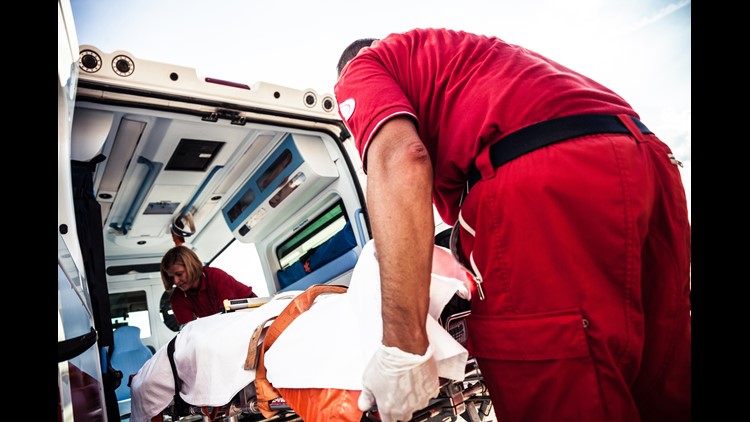HARTFORD — Ambulance personnel in Connecticut, upset that a new law providing post-traumatic stress disorder benefits does not include thousands of paramedics and emergency medical technicians, are hoping to become a political force.
Efforts are under way to create an official association of paid and volunteer emergency medical responders to make sure the profession is aware of what’s happening in Hartford and has an opportunity to influence legislation from now on.
“We’re now awake, and we will be paying attention, and we will come to the point where we have a solid, unified voice,” said Robert Glaspy, a paramedic from Milford who is helping lead the effort. “This is a situation where we just want to give everybody a voice. We want to give every EMS provider — as a provider — a voice, not for any particular company, not for any particular entity.”
For the past six years, state lawmakers have debated whether to require Connecticut’s workers’ compensation laws to cover PTSD for first responders who witness a tragedy, such as the deadly Newtown school shooting in 2012. But municipal officials, as well as the Association of Connecticut Ambulance Providers, which represents the state’s ambulance groups, had voiced concern about the broadness of the bill and the likely high costs of potentially providing financial benefits for a lifetime.
In May, the Connecticut Conference of Municipalities announced it had finally reached a compromise only with unionized firefighters and police officers to provide benefits for up to one year. Under the agreement, a PTSD diagnosis must be made by a licensed psychiatrist or psychologist, in accordance with national standards. Also, a first responder must experience one of six qualifying events in order to receive benefits, such as witnessing the death of a child.
While lawmakers initially hailed the agreement as a major step forward in the effort to provide mental health services to first responders, many voiced anger on the Senate and House floors after learning paramedics, emergency medical technicians and other medical technicians were not included.
Ultimately, the bill, which Democratic Gov. Ned Lamont recently signed into law, only required a study of whether to extend the legislation to emergency medical responders and Department of Correction officers.
“I wish this bill did more,” said Rep. William Buckbee, R-New Milford.
The Connecticut Conference of Municipalities has expressed a willingness to consider adding emergency medical workers to the law at some point, saying this year’s legislation addresses the “most pressing public health need” with the police and firefighters but can be improved over time.
Paramedic Derrick Caranci, of North Canaan, said he doesn’t have a problem with police and firefighters getting the benefits. But he said it was clear emergency medical responders didn’t have representation during the negotiations on the bill. There are roughly 20,000 paramedics, emergency medical technicians and other medical technicians working for paid companies or volunteer organizations in Connecticut.
“We should have people sitting at the table when these decisions are being made,” he said. “It was an eye-opening experience about who’s really making the rules up there, who’s got the leverage. That’s why we need to get ahead of this.”
David Lowell, chief operating officer of Hunter’s Ambulance and president of the Association of Connecticut Ambulance Providers, has taken a lot of criticism from medics who believe he opposed including them in the PTSD for financial reasons. While Lowell acknowledges opposing previous bills because they were drafted too broadly, he said this year’s version was negotiated behind closed doors.
“There was zero opportunity for input,” he said.
After seeing the final product, Lowell said he supports including emergency medical providers in the legislation. He noted that the law limits the PTSD diagnosis to specific workplace events, including situations many medics experience daily.
“They are subjected, by their vocation, to be exposed to bad things more frequently, no doubt,” said Lowell, a former paramedic. “They should be included, no question about it.”



